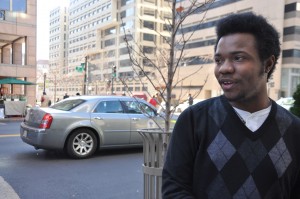WASHINGTON – Tracye Redd won’t be home in Waterloo, Iowa, for Christmas. The 20-year-old will stay in Washington and pull in a few extra hours of work.
The holidays don’t inspire warm memories of family and friends for Redd. They’re a hard reminder of the absence of a permanent family growing up as a foster child.

Tracye Redd of Waterloo, Iowa moved to Washington, D.C. for an internship where he speaks out about his foster care experience.
When Redd was about 15, he remembers writing a holiday wish list to give to the director of his youth shelter. It was his second time staying at the shelter, and he was excited to spend Christmas with familiar faces.
“He was really nice,” Redd said of the program director, “if you told him you wanted a CD player, which was cool back then, he’d get you a CD player and a CD or two that you wanted.”
Two weeks before Christmas, though, Redd received a call from his social worker: It was time to move again. He ended up in a treatment center where many of the boys had been in juvenile detention.
Redd was upset and confused. He had battled isolation, homelessness and thoughts of suicide since he entered the foster care system when he was 12—but he didn’t have a juvenile record.
Some of the boys were able to go home to their biological families for the holidays, but because he was new, Redd stayed behind at the facility with strangers.
“Ever since then, the holidays have never been the same,” Redd said.
There were almost 6,600 children in Iowa foster care in 2009, the most-recent year in which statistics were available in a report released by the Children’s Defense Fund.
Teens 14 to 17 comprised 37 percent of kids in foster care, dwarfing any other age group in Iowa. It is a trend mirrored in the national statistics for the estimated 408,000 children in the foster care system, the number in 2010.
But there are groups trying to change that.
Redd is a member of Foster Club, a national program based in Oregon that builds a peer network for foster kids. He was the 2011 Iowa All-Star, learning advocacy and public speaking as he participated in conferences to influence change in the system.
He spent the internship telling his story to foster kids, parents, judges and senators, promoting the idea of permanency, or lifelong relationships through adoption.
Struggling with the adoption option
A lot of kids turn down adoption because they feel they are betraying their biological family, Redd said. “When you’re first in foster care, you want your parents to do better so you can go back home,” he said. They think: “I have a family, why would I want another one?”
Redd isn’t alone. An estimated 107,000 children are waiting to be adopted. Others don’t understand adoption and don’t want to know more about it when asked. Redd was asked about adoption once in passing, but he can’t remember any of the details. It didn’t seem important, and he was never asked again.
Redd “aged out,” meaning he was released from foster care when he was 18.
“Adoption means a lot to me,” said 14-year-old adoptee Alexis Looney from southern Colorado. “For foster kids, at least for me, it’s a day when all the pain of losing people and never fitting in and never feeling loved and trouble spots all just go away because you know you belong somewhere now.”
“Every kid deserves a chance. When you say someone is unadoptable you’re taking their hope away, and it’s just not fair,” Looney said. “Look at me, I’m 14 and I’m adopted. Every child is adoptable.”
Congress is looking for new solutions at the grassroots level through the Senate Foster Youth Caucus, formed in 2009 and co-chaired by Sen. Chuck Grassley, R-Iowa.
At a caucus in late November, Wendy’s Wonderful Kids, administered by the Dave Thomas Foundation for Adoption, featured techniques that improve the adoption rate of teens by three times over those not served by the organization.
“A major goal of the Senate Caucus on Foster Youth is to help draw out and spread innovative strategies and best practices in the foster care community,” Grassley said.
What inspires Redd? “I tell myself to beat the statistic,” he said. Redd graduated from high school and wants to attend college in Washington. “If you look at the statistics for black males in America and throw on top of that the foster care system, I should be in jail right now.”
Iowa’s foster youth are 64 percent white, 15 percent black and 8 percent Hispanic.
Black children in foster care are still overrepresented, according to the Children’s Defense Fund.
Two of every seven black children living in Iowa are in foster care. “Thirty percent of the children in foster care are Black, double the percent of the child population who are Black,” the fund said in a May 2011 release.
“I also do it for the people I call my brothers and sisters who are still in the foster care system,” Redd said, “all half-million of them who need someone to look up to, to show them it does get better.”
For more information about adoption in Iowa, contact Iowa Kids Net, a partnership of six non-profit agencies that handle adoption at 1-800-243-0756. For other ways to get involved, contact the Elevate program for foster care and adoptive teens through the Children and Families of Iowa at 515-288-1909.

